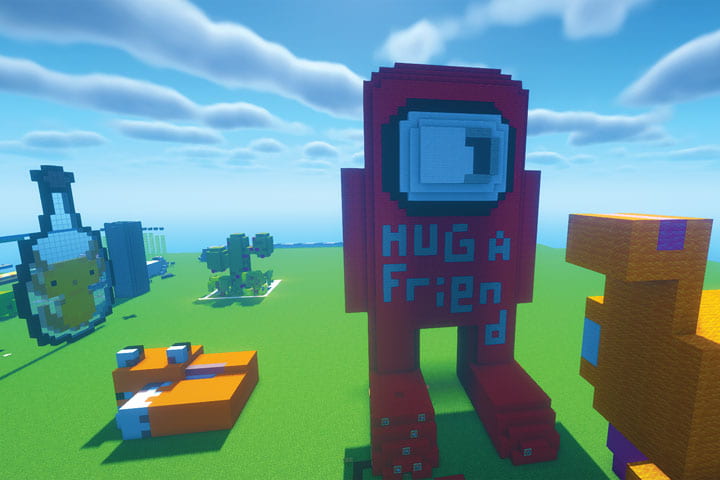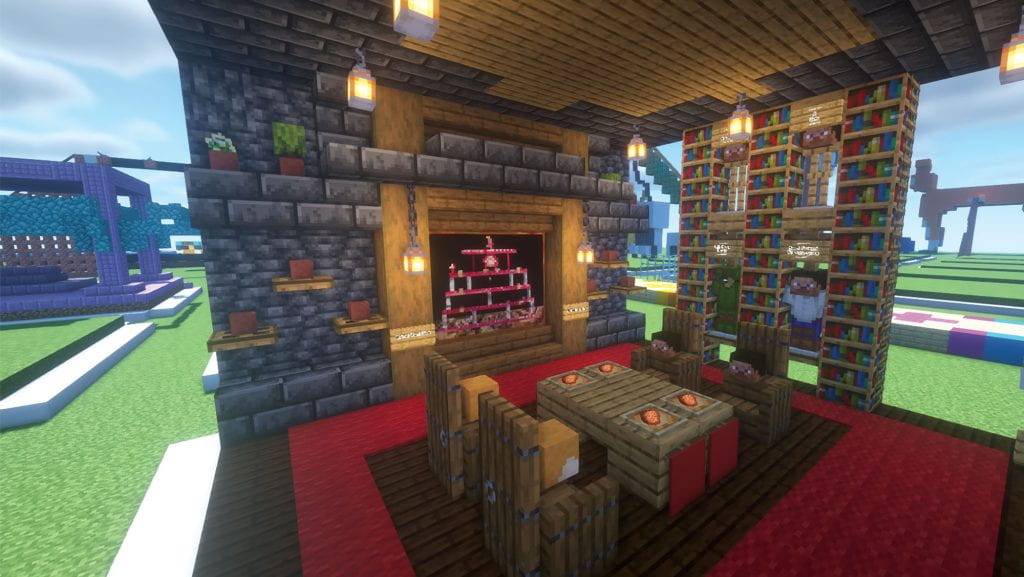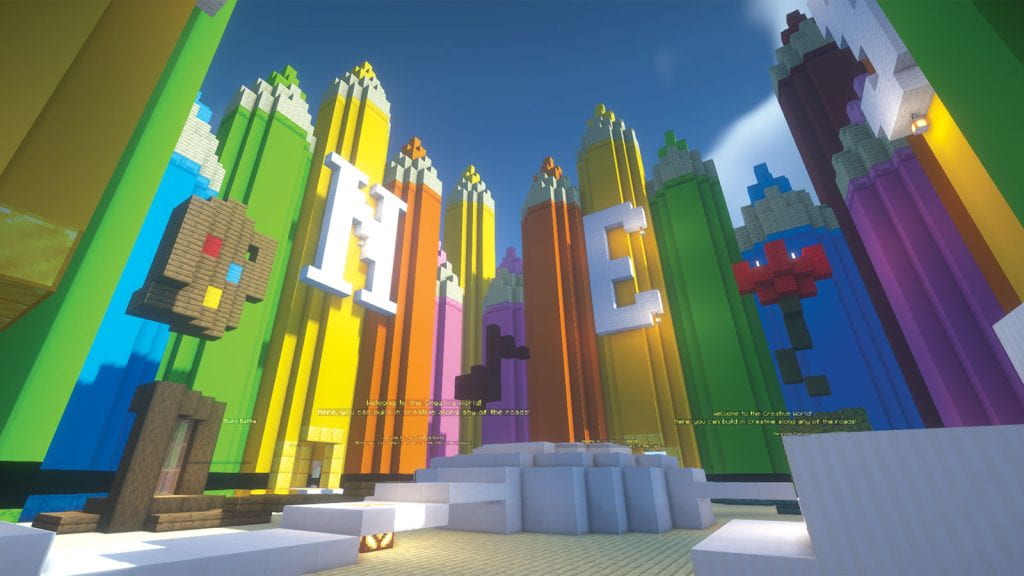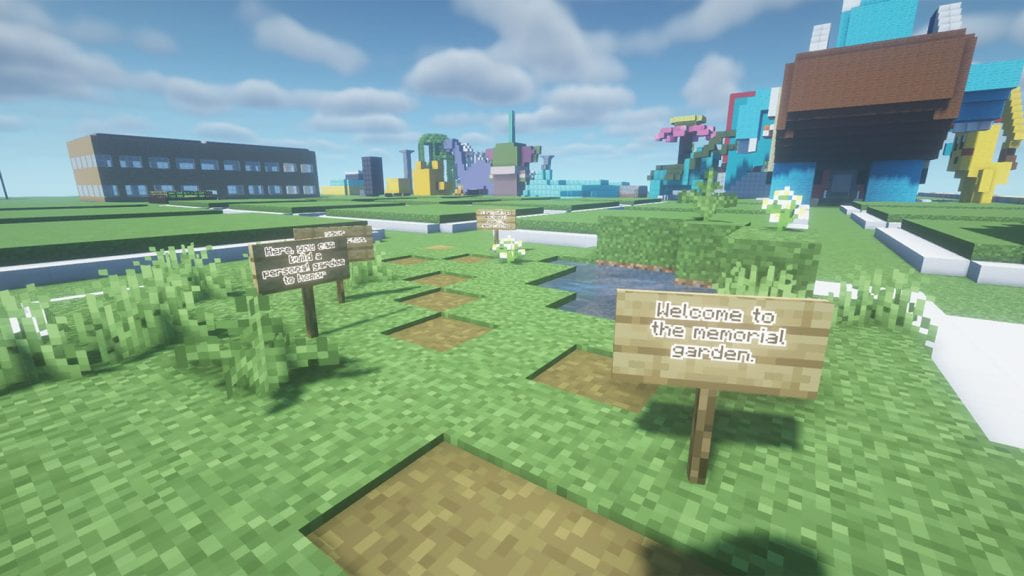
Virtual Solace
ExperienceCraft offers children a safe online realm in which to grieve and find support from peers
Few adults make it far into life without experiencing the loss of someone close to them. Then they lose others, and it still never makes sense – that void where someone was once so present.
Losing a parent or loved one has to be that much harder for children. With their minds still forming and their emotions still raw, they are ill-equipped to cope with the anguish of irreversible loss, especially when that loss is someone they had counted on to guide them.
There is help, but services have been stretched thin since the ranks of grieving youths increased during the pandemic.
“Some 5.6 million kids will experience the death of a parent, sibling, primary caregiver or someone else close to them by the time they’re 18, and there are just not enough support services for their mental health or grief support,” says Courtney Dubin, chief innovation officer at Experience Camps, a nationwide nonprofit that runs no-cost summer camp programs focused on helping kids come to terms with their grief. “Even with six locations, Experience Camps can only help about 1,200 kids.”
Two years ago, she contacted old friend Katie Salen Tekinbaş with the aim of finding help for grieving youths in the world of online computer gaming.

Salen Tekinbaş – a UCI professor of informatics who teaches in the undergraduate computer game science program and the master’s program in human-computer interaction and design – immediately picked up on what Dubin was asking for, recalling, “One of the things about their summer camp is that you meet really cool kids and counselors who understand you, share intense experiences with them and then, bam, it’s over.”
She adds: “Since game servers can be online year-round, Courtney and I thought this might be a way Experience Camps’ kids can stay connected. They also saw it as a way for kids who were not able to physically attend camp to still benefit from it.”
Their conversation resulted in ExperienceCraft, a game launched in August 2022 that was created to be an online world in which grieving kids between the ages of 7 and 14 can play, learn, and find help in expressing and mitigating their grief. As with the Experience Camps real-world retreats, much of that help comes from interacting with other youths who have experienced similar losses, as well as with game moderators.
A Safe Space
A computer game might not strike many as a suitable place for coping with the emotional trauma of loss, since the gaming universe is better known for adrenaline-fueled adventures in carjacking, decapitating zombies and sundry mayhem.
ExperienceCraft, however, is a variant of Minecraft, a digital world that looks like it’s made of fuzzy Lego blocks and is tremendously popular with young gamers. It offers a modicum of conflict and survival quests but is chiefly designed as a digital place for kids to create, build and cooperate with other players.
A basic Minecraft server (linked with a Discord server for gamers to voice chat) was transformed into the grief-focused ExperienceCraft by a development team from Connected Camps, a nonprofit co-founded by Salen Tekinbaş and cultural anthropologist Mimi Ito, director of UCI’s Connected Learning Lab, informatics professor-in-residence and MacArthur Foundation Chair in Digital Media and Learning.
Salen Tekinbaş served as ExperienceCraft’s creative director, though she says the development team – several of them UCI students and grads – did the heavy lifting, with input from Ito’s research findings, as well as from UC Berkeley’s Institute of Human Development, and Dubin and others at Experience Camps.
The resulting game has the traditional elements of Minecraft plus special games, cooperative building projects and places tailored for the players. “It’s a very specific vulnerable population that we’re working with,” Salen Tekinbaş says. “We built a set of structures to help kids feel connected with each other.”
“When I was 15, one of my closest friends committed suicide. That dark, lonely time rocked me for over two years. When I was working on ExperienceCraft, it struck me how much I would have loved having something like it to turn to.”
Sage Mahmud ’22, ExperienceCraft developer
Campgrounds are one example: Kids join a virtual campground so they always have a space to go to where other children they meet in the game are going to be, versus wandering through the big world by themselves, which could easily trigger feelings of isolation.
A central ExperienceCraft feature is the “Memorial Garden,” where each child has a protected plot on which they can build things in remembrance of their lost person. It enables kids to take their grief and create something with it – everything from a tower to a re-creation of a special moment with their lost one.
“One child duplicated their dining room, with food on the table, family members in chairs and books on the shelves; it was a vivid, powerful memory of the times the family once had together,” Salen Tekinbaş says. “Another made a vignette of going fishing with his dad.”
An additional game feature, an island named “The Resort,” has its own special purpose. “If a player is engaging in destructive behavior or getting into a lot of drama with other kids, we teleport them to this nice, friendly resort,” Salen Tekinbaş says. “It’s our conflict resolution space, where a moderator can ask what happened and how the child might have done things differently. That creates a context for closed-up kids to share how they’re feeling.”
Connected Learning

Some of the concepts being employed in ExperienceCraft go way back. Several years prior to the start of Connected Camps in 2015, Salen Tekinbaş and Ito collaborated with others on a MacArthur Foundation Digital Media and Learning Initiative to develop a model known now as connected learning.
“It validated a commonsensical notion that young people learn best when they’re doing something that they’re actually interested in – and when they feel a sense of belonging, social connection and support,” Ito says. “Not many games aim for that, but my research looks at how kids themselves are creating new things together within existing games and using digital and network technology as an empowered form of self-expression, learning and creation in the context of a social environment.”
She adds: “The loss of a parent is one of the biggest risk factors for mental health problems in children and youths. The work Katie is doing with ExperienceCraft can be an important and viable source for the kind of social support they need.”
Among Connected Camps’ strategies for connecting with kids is drawing many of its designers and moderators from “near peers,” generally meaning adults young enough to remember what it feels like to be a kid. Consequently, the nonprofit relies on a number of UCI students.
One of ExperienceCraft’s lead developers was Sage Mahmud, who earned a bachelor’s degree in computer science at UCI in 2022 and possesses an expertise in game design that was sparked by Salen Tekinbaş’ classes.
He recalls: “I just thought ExperienceCraft would be an interesting project, but it became really important to me – and the entire development team – because building a space where kids experiencing grief can interact with others and process their emotions was such a good thing to do.”
And it’s something that hit close to home for him.
“When I was 15, one of my closest friends committed suicide,” Mahmud says. “That dark, lonely time rocked me for over two years. When I was working on ExperienceCraft, it struck me how much I would have loved having something like it to turn to.”
Scaling Up
It may be a while before everyone who might benefit from ExperienceCraft has an opportunity to. Expanding its reach takes more than just adding more users.
For one thing, Salen Tekinbaş says, it’s crucial for the players’ security that new users are confirmed to also be youths dealing with a death.
It’s no less important that there is a sufficiency of capable moderators – ideally, at least one per every 10 players – to assist kids in the game.

Part tour guide, part camp counselor and part mentor, any new moderator will need vetting and training. They must possess not just people skills but kid skills, and it helps if someone is already steeped in Minecraft or computer gaming in general.
While some moderators are volunteers, others need to be paid. The more ExperienceCraft grows, the more time-consuming training and funding it will need.
There are indications, however, that many future moderators will be coming from a proximate source, Salen Tekinbaş says: “What we’re finding more and more is that youths on the server are quickly leveling up to take on leadership roles. I think we’ll be recruiting more mentors from within the server community itself.”
Connected Camps is currently conducting a slow rollout of ExperienceCraft, partnering with Boys & Girls Clubs around the nation. The clubs will be screening participants and providing moderators. One will be in Uvalde, Texas, where youths saw 19 of their classmates and two adults killed in a school shooting last year. Connected Camps is also working with the Tragedy Assistance Program for Survivors, a nonprofit that aids survivors of military deaths, to make the game available to youths in Gold Star families.

By a recent count, 15 of Connected Camps’ moderators are UCI students or grads. One of the latter is Amy Pham, who earned a bachelor’s degree in public health policy in 2019. She’s been working with Connected Camps for three years and enthusiastically signed up to moderate ExperienceCraft sessions.
“I lost my grandmother when I was a kid, and the grief ripped through my life like a tornado,” Pham says. “So I really wanted to help these kids to thrive and grow with their grief.”
As a moderator, she familiarizes new players with the landscape, chats with them, leads them into games and building activities, and helps them if they’re having problems.
“Sometimes there will be arguments and outbursts, which is normal for kids, especially for those who’ve experienced trauma,” Pham says. “When they raise their voice, it’s usually indicative that they felt they weren’t being heard in the past when they were hurting. They’re subconsciously saying, ‘Please hear me. Nobody’s listening to me.’ We tell them, ‘Hey, I definitely hear you loud and clear. Let’s settle down and talk about why you’re feeling this way.’”
“You’re letting them know they’re not invisible, that their grief doesn’t mean they have to feel isolated.”
Amy Pham ’19, ExperienceCraft moderator
She adds: “You’re letting them know they’re not invisible, that their grief doesn’t mean they have to feel isolated. Those are moments to connect with kids and get an idea of what’s going on with them that we can possibly help with.”
While always ready to assist, Pham says there are many times when it’s better to just observe.
“Usually, it’s the kids themselves helping each other and driving things forward,” she says. “No matter where they are in their journey, other kids always lend a hand. It can just be showing a newcomer how to execute a command, but I’ve seen small things like that open doors for them where next they’re having a conversation about the losses they’ve both been through.”
“I try to put my best foot forward every day, because I know how much it means to them – and to me,” Pham continues. “I wanted to be able to put what I learned at UCI to work, and it gives me great joy seeing these kids opening up and learning to move forward in their lives with their grief.”